2021--2022学年北师大版英语七年级上册期末专题复习:一般现在时课件(共26张PPT)
文档属性
| 名称 | 2021--2022学年北师大版英语七年级上册期末专题复习:一般现在时课件(共26张PPT) | 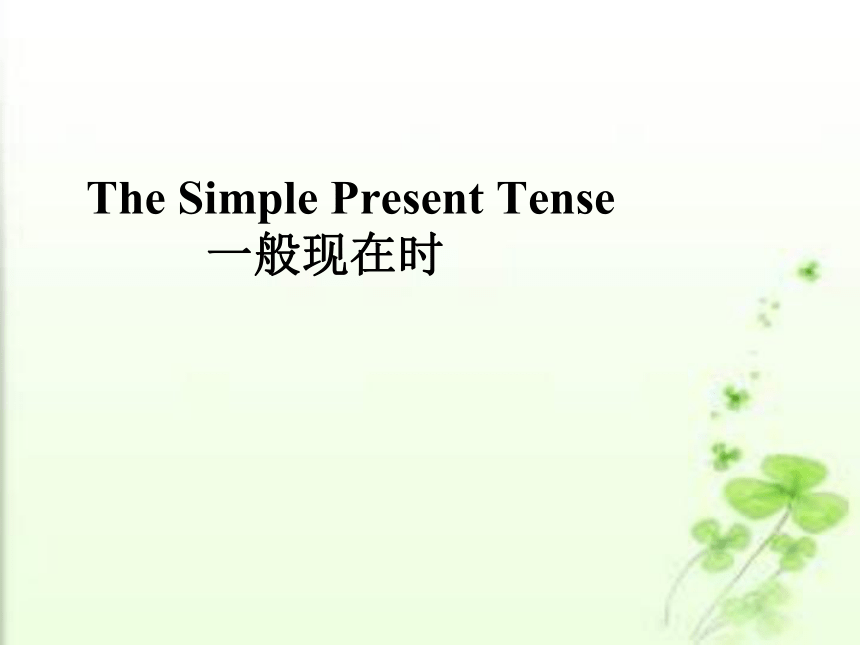 | |
| 格式 | zip | ||
| 文件大小 | 333.9KB | ||
| 资源类型 | 教案 | ||
| 版本资源 | 北师大版 | ||
| 科目 | 英语 | ||
| 更新时间 | 2022-01-29 07:52:52 | ||
图片预览


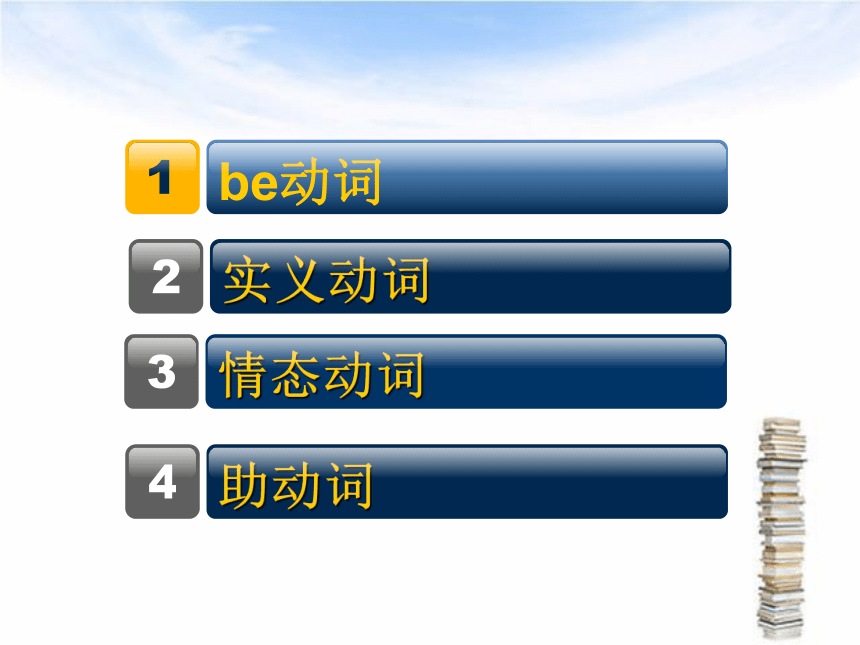

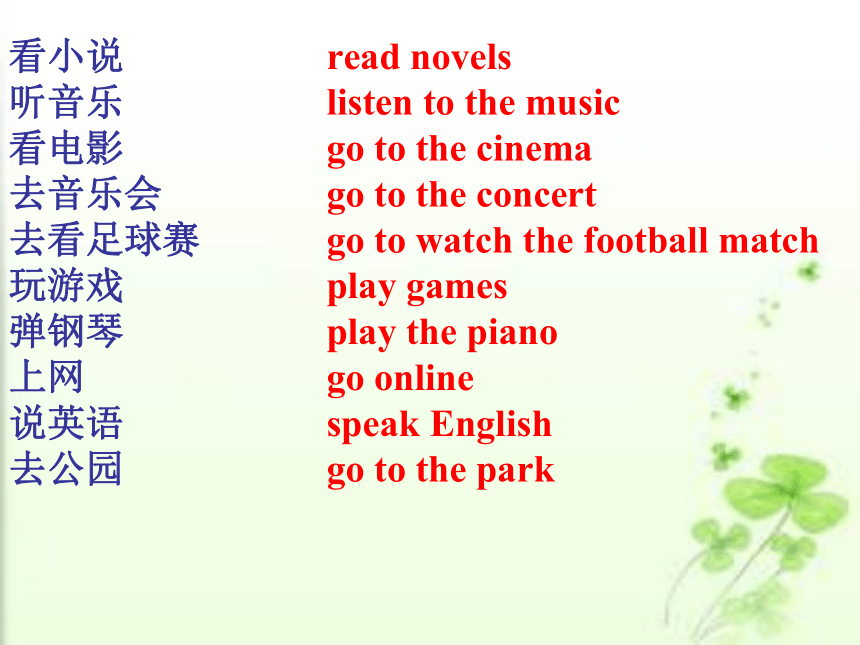
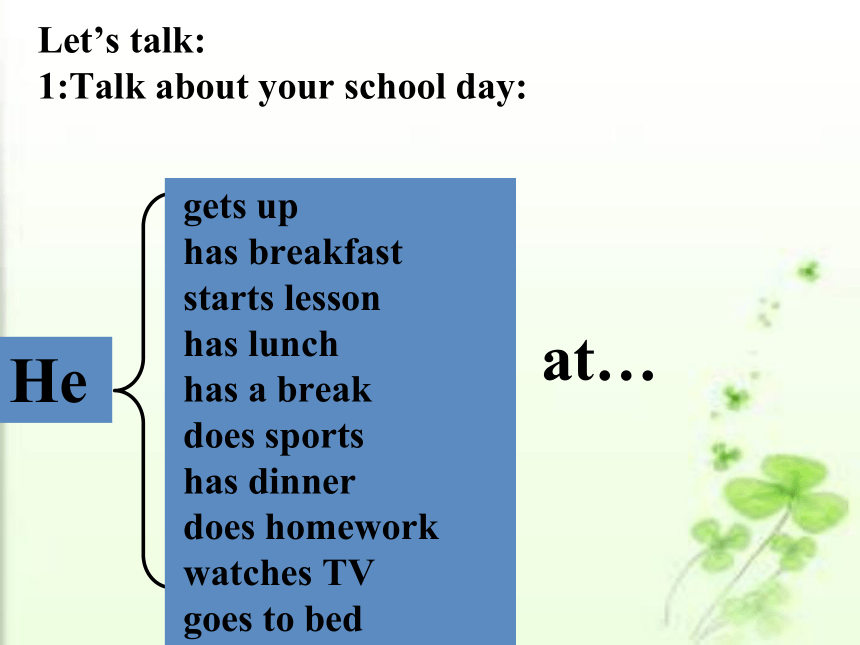
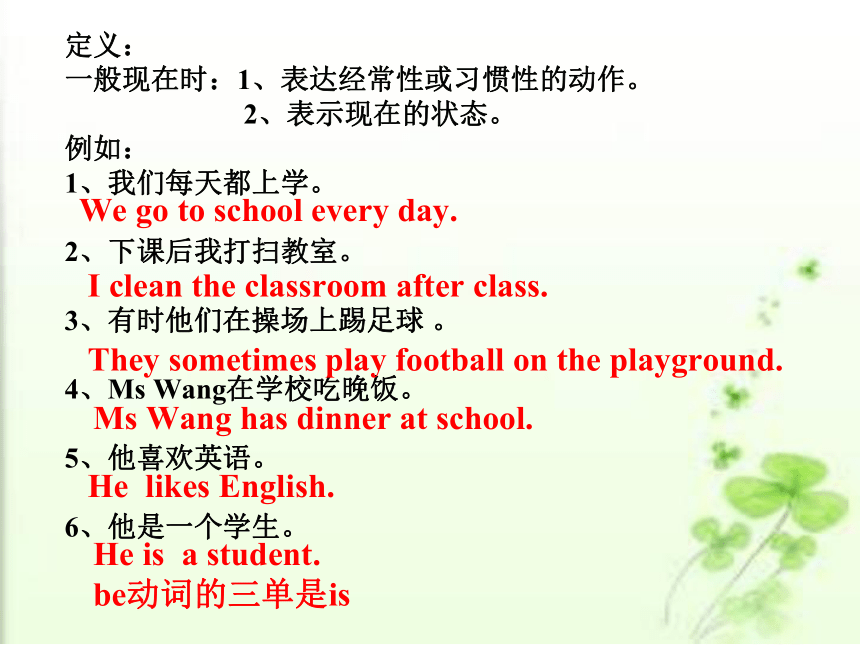
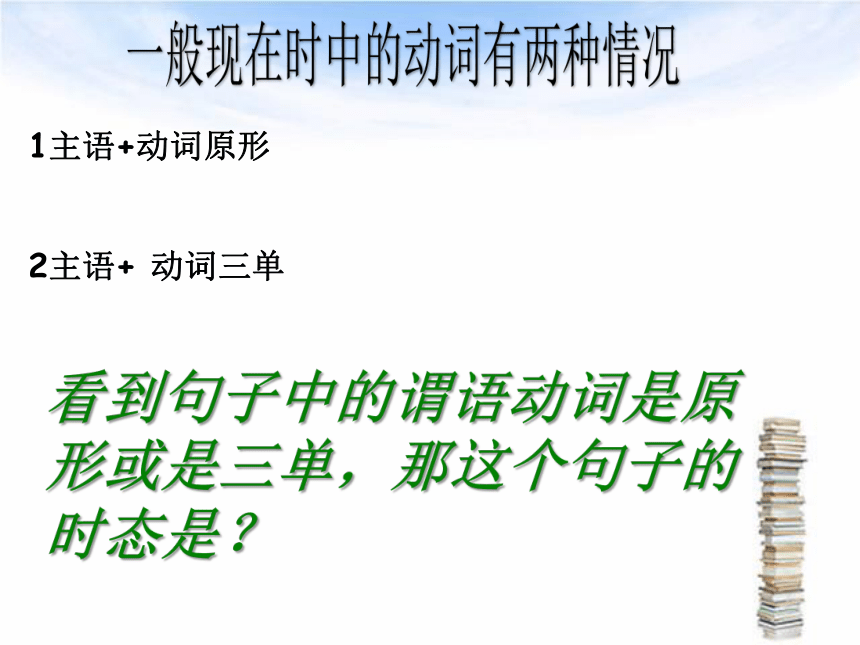
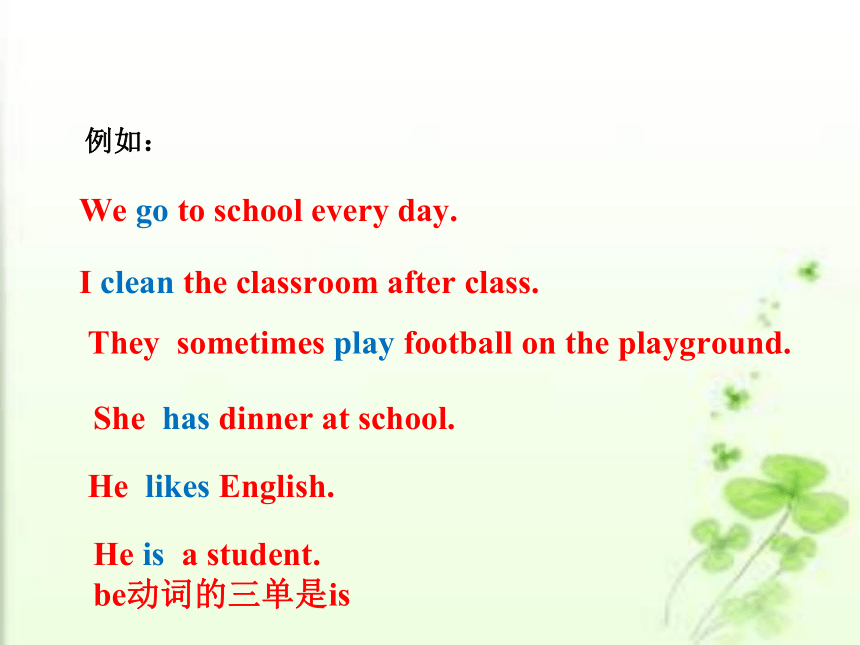
文档简介
(共26张PPT)
The Simple Present Tense
一般现在时
时态与动词相关
be动词
1
情态动词
3
实义动词
2
助动词
4
Let’s remember:
Do you remember the words in your life
你记得你生活中的一些常用词汇吗?
起床
吃早饭
上课
吃午饭
休息
做运动
吃晚餐
做家庭作业
看电视
上床睡觉
get up
have breakfast
start lesson
have lunch
have a break
do sports
have dinner
do homework
watch TV
go to bed
看小说
听音乐
看电影
去音乐会
去看足球赛
玩游戏
弹钢琴
上网
说英语
去公园
read novels
listen to the music
go to the cinema
go to the concert
go to watch the football match
play games
play the piano
go online
speak English
go to the park
Let’s talk:
1:Talk about your school day:
get up
have breakfast
start lesson
have lunch
have a break
do sports
have dinner
do homework
watch TV
go to bed
I
at…
He
gets up
has breakfast
starts lesson
has lunch
has a break
does sports
has dinner
does homework
watches TV
goes to bed
定义:
一般现在时:1、表达经常性或习惯性的动作。
2、表示现在的状态。
例如:
1、我们每天都上学。
2、下课后我打扫教室。
3、有时他们在操场上踢足球 。
4、Ms Wang在学校吃晚饭。
5、他喜欢英语。
6、他是一个学生。
We go to school every day.
I clean the classroom after class.
They sometimes play football on the playground.
Ms Wang has dinner at school.
He likes English.
He is a student.
be动词的三单是is
一般现在时中的动词有两种情况
1主语+动词原形
2主语+ 动词三单
看到句子中的谓语动词是原形或是三单,那这个句子的时态是?
例如:
We go to school every day.
I clean the classroom after class.
They sometimes play football on the playground.
She has dinner at school.
He likes English.
He is a student.
be动词的三单是is
一般现在时用什么助动词?
要用 do, does
助动词:
构成否定句
句子中必须有否定词
I do not like you.
He does not know Bill.
She does not write homework.
It does not run.
You do not watch the football match.
借助助动词do\does后加not构成否定句
1
构成一般疑问句
Do you work every day
Does he go to shcool every day
什么是一般疑问句?
它是只用yes(是)或no(否)来回答的句子
Does she go home Yes, she does.
No, she doesn`t.
Do they walk to school Yes, they do.
No, they don`t.
Do you want to swim Yes, I do. No, I do not.
一般现在时你要注意什么?
SUMMARY
句子的主语是:
①第三人称
②单数
实义动词用三单形式!
①stop-stops [s] ; make-makes [s]
②read-reads [z] ; play-plays [z]
1.一般动词在词尾加s。
(“s”在清辅音后发音为/s/,在浊辅音及元音后发音为 /z/)
实义动词三单形式的变化规则
teach-teaches watch-watches
miss—misses brush—brushes
mix—mixes
2、以“s, x, ch, sh”结尾的,在词尾加“es”,发音为/iz/
go-goes [z] do-does [z]
3、以“o”结尾的动词,加“es”
fly-flies [iz]; carry-carries [iz]
study-studies [iz]; worry-worries [iz]
4、以辅音字母加“y”结尾的,将“y”变为“i”,然后再加“es”。
实义动词三单形式的变化规则
1、一般动词在词尾加-s
2、以字母s,x,ch,sh结尾的动词加-es
3、以o结尾的动词一般加-es
4、以辅音字母加y结尾的动词,先变y为i,再加-es
不规则变化的实义动词have的单三形式是has。
用动词的适当形式填空。
1、He often _____ (have) dinner at home.
2、She _____ (go) shopping with me.
3、Tim and Tommy ______(be) in Class One.
4、My uncle ______ (read) books with me.
5、My aunt _______ (make) toys with me.
6、She and I ______ (take) a walk together everyday.
7、Mike ______ (like) cooking.
has
goes
are
reads
makes
take
likes
一般现在时你要注意什么?
SUMMARY
时间状语:
①频率副词 ②常用时间状语
Always, usually, often, sometimes, hardly, never
Every day, once a week。。。
2:Talk about the things you always/ usually /often /sometimes/never do in your life.
read novels
listen to the music
go to the cinema
go to the concert
go to watch the football match
play games
play the piano
go online
speak English
go to the park
I
always
usually
often
sometimes
never
He
reads novels
listens to the music
goes to the cinema
goes to the concert
goes to watch the football match
plays games
plays the piano
goes online
speaks English
goes to the park
Thank you!
The Simple Present Tense
一般现在时
时态与动词相关
be动词
1
情态动词
3
实义动词
2
助动词
4
Let’s remember:
Do you remember the words in your life
你记得你生活中的一些常用词汇吗?
起床
吃早饭
上课
吃午饭
休息
做运动
吃晚餐
做家庭作业
看电视
上床睡觉
get up
have breakfast
start lesson
have lunch
have a break
do sports
have dinner
do homework
watch TV
go to bed
看小说
听音乐
看电影
去音乐会
去看足球赛
玩游戏
弹钢琴
上网
说英语
去公园
read novels
listen to the music
go to the cinema
go to the concert
go to watch the football match
play games
play the piano
go online
speak English
go to the park
Let’s talk:
1:Talk about your school day:
get up
have breakfast
start lesson
have lunch
have a break
do sports
have dinner
do homework
watch TV
go to bed
I
at…
He
gets up
has breakfast
starts lesson
has lunch
has a break
does sports
has dinner
does homework
watches TV
goes to bed
定义:
一般现在时:1、表达经常性或习惯性的动作。
2、表示现在的状态。
例如:
1、我们每天都上学。
2、下课后我打扫教室。
3、有时他们在操场上踢足球 。
4、Ms Wang在学校吃晚饭。
5、他喜欢英语。
6、他是一个学生。
We go to school every day.
I clean the classroom after class.
They sometimes play football on the playground.
Ms Wang has dinner at school.
He likes English.
He is a student.
be动词的三单是is
一般现在时中的动词有两种情况
1主语+动词原形
2主语+ 动词三单
看到句子中的谓语动词是原形或是三单,那这个句子的时态是?
例如:
We go to school every day.
I clean the classroom after class.
They sometimes play football on the playground.
She has dinner at school.
He likes English.
He is a student.
be动词的三单是is
一般现在时用什么助动词?
要用 do, does
助动词:
构成否定句
句子中必须有否定词
I do not like you.
He does not know Bill.
She does not write homework.
It does not run.
You do not watch the football match.
借助助动词do\does后加not构成否定句
1
构成一般疑问句
Do you work every day
Does he go to shcool every day
什么是一般疑问句?
它是只用yes(是)或no(否)来回答的句子
Does she go home Yes, she does.
No, she doesn`t.
Do they walk to school Yes, they do.
No, they don`t.
Do you want to swim Yes, I do. No, I do not.
一般现在时你要注意什么?
SUMMARY
句子的主语是:
①第三人称
②单数
实义动词用三单形式!
①stop-stops [s] ; make-makes [s]
②read-reads [z] ; play-plays [z]
1.一般动词在词尾加s。
(“s”在清辅音后发音为/s/,在浊辅音及元音后发音为 /z/)
实义动词三单形式的变化规则
teach-teaches watch-watches
miss—misses brush—brushes
mix—mixes
2、以“s, x, ch, sh”结尾的,在词尾加“es”,发音为/iz/
go-goes [z] do-does [z]
3、以“o”结尾的动词,加“es”
fly-flies [iz]; carry-carries [iz]
study-studies [iz]; worry-worries [iz]
4、以辅音字母加“y”结尾的,将“y”变为“i”,然后再加“es”。
实义动词三单形式的变化规则
1、一般动词在词尾加-s
2、以字母s,x,ch,sh结尾的动词加-es
3、以o结尾的动词一般加-es
4、以辅音字母加y结尾的动词,先变y为i,再加-es
不规则变化的实义动词have的单三形式是has。
用动词的适当形式填空。
1、He often _____ (have) dinner at home.
2、She _____ (go) shopping with me.
3、Tim and Tommy ______(be) in Class One.
4、My uncle ______ (read) books with me.
5、My aunt _______ (make) toys with me.
6、She and I ______ (take) a walk together everyday.
7、Mike ______ (like) cooking.
has
goes
are
reads
makes
take
likes
一般现在时你要注意什么?
SUMMARY
时间状语:
①频率副词 ②常用时间状语
Always, usually, often, sometimes, hardly, never
Every day, once a week。。。
2:Talk about the things you always/ usually /often /sometimes/never do in your life.
read novels
listen to the music
go to the cinema
go to the concert
go to watch the football match
play games
play the piano
go online
speak English
go to the park
I
always
usually
often
sometimes
never
He
reads novels
listens to the music
goes to the cinema
goes to the concert
goes to watch the football match
plays games
plays the piano
goes online
speaks English
goes to the park
Thank you!
同课章节目录
